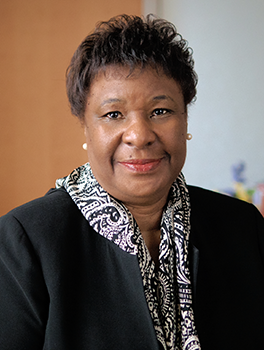Cleopatra Caldwell
"Making the adjustment into graduate school was challenging. CEW+ provided a support system—the Center was always there and you could go to them with any kind of challenge you were facing."

Dr. Cleopatra Caldwell, Chair of the Department of Health Behavior and Health Education, Professor of Health Behavior and Health Education, Director of the Center for Research on Ethnicity and Culture and Health, and Co-Associate Director of the Program for Research on Black Americans at the University of Michigan, not only encourages her students at the School of Public Health to apply for scholarships at CEW+ and utilize its resources but has a personal connection with the Center herself. “CEW+ is a tremendous resource that I feel very close to because of my experience with them as a graduate student and over the years as a faculty member,” Dr. Caldwell shared. “I was a student who came back for a PhD after working for six years, so I was a more mature student. Making the adjustment into graduate school was challenging. CEW+ provided a support system—the Center was always there and you could go to them with any kind of challenge you were facing.”
Today, Dr. Caldwell is an expert in community-based participatory research and a lead researcher in intervention programs, particularly surrounding the well-being of Black populations and adolescents. She is the Principal Investigator for the Fathers and Sons program which uses community engagement and intervention to enhance the parenting skills of nonresident Black fathers to provide an extra safety net for their children in preventing risk behaviors. Based in Flint, MI, and in its twentieth year, the program has expanded into Chicago. In addition, Dr. Caldwell has conducted community forums with adolescents in Flint with the goal of developing a youth steering committee empowered as decision-makers who present issues that need to be addressed as part of the Flint water crisis. She is also working on a project interviewing teenage fathers and their families surrounding the experiences of pregnancy and fatherhood and is a part of the program for Research on Black Americans at the Institute for Social Research where she looks at the mental health of Black youth in relation to ethnic diversity that exists within Black populations.
Since receiving her CEW+ fellowship while earning her PhD in Social Psychology, Dr. Caldwell has stayed connected with CEW+. Once a graduate student who utilized the Center’s workshops, as a faculty member she has participated as a member of the CEW+ Scholarship Selection Committee, spoken at CEW+ Scholar research panels, and partaken in CEW+ development activities. On a personal note, the friend who introduced Dr. Caldwell to the Center, fellow CEW+ Scholar Dr. Ruby Beale, is one of Dr. Caldwell’s closest friends today. “To have a connection from so long ago that still remains—that’s an important part of the CEW+ network,” Dr. Caldwell said. “CEW+ provides a network of opportunities that allows you to stay in contact with CEW+ staff and exposes you to things you may not have considered. When I think of CEW+ Scholars, one of the most important things the program does is connect you with a network that follows you throughout your career.”
To help celebrate the 50th anniversary of CEW+ awarding scholarships, please consider making a gift to our Potential Made Possible Scholarship fund. Your donation can help ensure the next 50 years of CEW+ scholars. Click here for more information.


